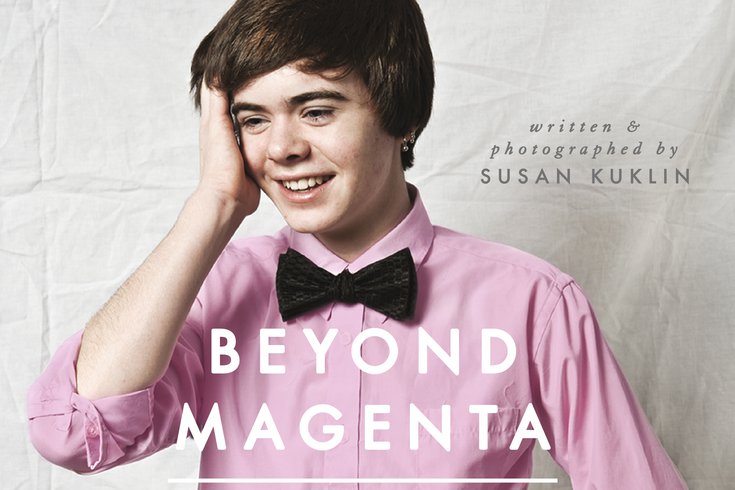
April 24, 2023
 Provided image/Candlewick Press
Provided image/Candlewick Press
Susan Kuklin's 'Beyond Magenta,' pictured above, features interviews with six transgender teenagers, who are also photographed. It has been banned or challenged in schools and libraries across the country.
The first year Susan Kuklin made the American Library Association's list of the most challenged books in the country, her book was ranked just below E.L. James' "Fifty Shades of Grey."
That novel was infamous for its explicit depictions of BDSM sexual encounters between a fictional millionaire and a college student. Kuklin's book, "Beyond Magenta," was just about six real transgender teens navigating life.
But while James' erotica has not appeared on the list since 2015, Kuklin's book has made it two more times — in 2019 and 2021. "Beyond Magenta," was not included on the 2022 edition, released Monday, but it ranks No. 27 on the ALA's most challenged books of the 2010s.
"Frankly, I felt – and feel – awful," the Philadelphia-born author said by email. "Creepy. Here are six truly wonderful young people coming forward to tell their truth, to help others, and to show how much more we have in common than we have differences.
"They should be – and are – celebrated, not banned."
As parents and other library patrons increasingly seek to challenge books with LGBTQ+ themes, "Beyond Magenta" is one of many in the crosshairs. Half of the books on the ALA's latest list were challenged due to queer content, and the same was true in 2021. The Central Bucks School District, in the Philadelphia suburbs, recently implemented a widely criticized policy that allows any resident to challenge a book in school libraries, putting its potential removal to a school board vote. One of the first five books the board decided to review? "Beyond Magenta."
Critics of the book, published in 2014, have claimed it is "sexually explicit," but the actual content is hardly risque. The six subjects discuss anatomy, the difficulties of dating while trans and the impact of hormones on sex drive, but there are no specific descriptions of sexual acts in the book's 192 pages — unless you count the occasional PG-rated line like "I touched their you-know-whats."
Most of the book instead explores the teens' struggles to understand their feelings of discomfort and alienation growing up and how their friends and families reacted to their transitions.
"All of a sudden, I was forced to wear a skirt and panty hose. I hated it," a typical passage reads. "Panty hose! I hated it completely. I liked to run around, and I'd fall and rip my panty hose. My mom would get mad because she had to pay for new ones."
Kuklin, who grew up in Wynnefield and Penn Valley but now lives in New York, worked with the Callen-Lorde Health Clinic in New York to find interview subjects, relying on the transgender health care center to make introductions.
"I knew something about each participant before we met so I was predisposed to care about them," Kuklin said. "We also had long phone conversations prior to meeting about how and if we should proceed. They needed time to think about whether they would be comfortable in so public a medium. My job was to be non-judgmental, which was easy and never changed."
The author admits the maelstrom caught her by surprise. Her other nonfiction books have tackled difficult subjects, such as AIDS, teen pregnancy and death row. Those were not banned or challenged. But "Beyond Magenta," initially released in 2014 to positive reviews, has inspired a unique vitriol. While Kuklin keeps her email address and social media private, she said the book's publisher, Candlewick Press, gets plenty of "nasty stuff."
"I still receive positive, uplifting emails from trans teens, cis teens and parents," she said. "I so appreciate hearing from them. It makes the negative experience more than worthwhile."
According to polling from the ALA and EveryLibrary, roughly 70% of Americans across party lines oppose book bans. Yet, the surge in attempts to remove books from public spaces has been dramatic. Between 2010 and 2020, the ALA tracked an average 326 annual challenges to library, school and university materials. In 2021 alone, it counted 729.
A separate report by PEN America on the 2021-2022 school year recorded even higher numbers, listing 2,532 instances of individual books being banned. Only Florida and Texas initiated more bans than Pennsylvania, which had 457 bans across 11 school districts.
Kuklin said she sees a lot of cynicism and willful ignorance in the effort behind these bans, blaming "cruel politicians" for stoking "manufactured culture wars." It's not a matter of misunderstanding, she argues, but an outright refusal to learn through books, one of the oldest and most powerful tools for education and empathy.
"Most people who misunderstand the trans experience read little to nothing about the subject," Kuklin said. "Instead, they use this small, vulnerable population as an easy target to avoid the real issues the country faces.
"Several excellent, informative, important books about trans and nonbinary teens are available, and people who read them can make better-informed opinions. Check them out. Sadly, you can find many on the banned books lists."
Follow Kristin & PhillyVoice on Twitter: @kristin_hunt
| @thePhillyVoice
Like us on Facebook: PhillyVoice
Have a news tip? Let us know.